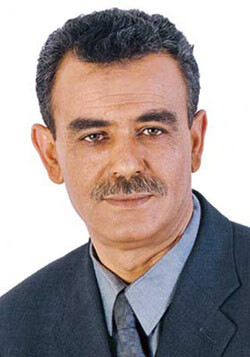Canadian University Press 16 February 2007

Member of Knesset Jamal Zalhalka
As part of the events, Jamal Zahalka, a Palestinian-Israeli member of Israel’s parliament, is giving a lecture titled “Debunking the myth of Israeli democracy” in Montreal and Toronto. The lecture is organized by Solidarity for Palestinian Human Rights. Zahalka is a member of the Palestinian-rights party Balad, which advocates for a secular democratic state and currently holds three seats in the Knesset, Israel’s parliament.
His lectures will focus on the current situation of Palestinian-Israelis, Palestinians who have lived within Israel’s boarders since 1948 and have Israeli citizenship, in addition to that of Palestinians living in the Israeli-occupied West Bank and Gaza Strip.
“Our situation is deteriorating towards apartheid, while the situation in Gaza and the West Bank is worse than apartheid,” he said, pointing to examples from the occupied areas: consistent military violence, roads exclusively for Jewish use, numerous checkpoints that restrict Palestinian mobility and the carving up of West Bank as the result of Israel’s separation barrier.
Highlighting the situation in the occupied territories, he added, “Apartheid in South Africa separated whites and blacks, while in Israel, it not only separates Jews and Palestinians, but also separates Palestinians from each other.”
According to Frank Dimant, executive director of B’nai Brith Canada, an international Jewish advocacy organization, Israel is a democracy that is not exercising apartheid anywhere. He went on to comment that the West bank and Gaza Strip are not occupied territories.
“Let’s not talk about occupation. Let’s talk about the territory that is now know as the Palestinian territory if you will, that’s known as Judea and Samaria,” he said, referring to the Biblical names of the area.
The United Nations Security Council passed resolution 242 in 1967, requiring Israel to leave the territories it occupied in the 1967 war. Resolution 446, passed in 1979, declares Israel’s settlements in the occupied territories to be illegal. Article 49 of the fourth Geneva Convention declares it illegal for an occupying force to move to establish settlement for its population in the occupied territory.
In order to highlight the type of discrimination Palestinian-Israelis face, Zahalka pointed to inequalities in access to land in Israel, where 93 per cent of it is owned either by the state, the Development Authority or the Jewish National Fund.
Though the land cannot be sold, Jewish citizens are entitled to both short- and long-term leases. Non-Jews cannot obtain long-term leases, effectively barring Palestinian-Israelis from long-term access to land. Zahalka also argued there is systematic discrimination against Palestinians in terms of obtaining citizenship. He highlighted the 2003 law barring citizenship and residency rights for Palestinian men under 35 and Palestinian women under 25 who marry Israeli citizens.
He also discussed discrepancies in school funding for Arab and Jewish students as examples of Israel moving towards apartheid within its pre-1967 boarders. But Dimant argues that Zahalka’s talk and his participation in the Knesset itself demonstrates that Israel is a democracy.
“The democracy [in Israel] is alive and well and [Zahalka] is certainly using its full advantage,” he said.
According to Ali Abunimah, founder of the Palestinian news and analysis site the Electronic Intifada and author of One Country, Palestinian-Israelis can vote but are marginalized by state polices and practices. Abunimah argues there is a problem with the conception of the Israeli-Palestinian conflict as focused on the occupation. He contends that instead of separating the situation of Palestinian refugees in the diaspora, Palestinian-Israelis and Palestinians living under occupation, they must collectively be seen as facing systematic Israeli oppression.
“This [systematic oppression] has three faces. One face is the occupied Palestinians, the second is the near-apartheid situation of Palestinians in Israel and the third face is the situation of the refugees in the diaspora,” he said, arguing they are a result of the same system of Israeli conquest.
“We need to recast the [understanding of the] conflict. Up until now the campaign has been ‘end the occupation’ which has come to mean nothing, even Ariel Sharon used the term,” he said. “The struggle is against the racism and colonialism of the State of Israel.”
Jesse Rosenfeld is Quebec Bureau Cheif for Canadian University Press (CUP).